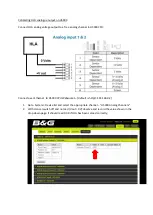
D-1
D
Alarm Messages
This section lists only the most important physiological and technical alarm messages.
Some messages appearing on your pulse oximeter may not be included.
In the tables below, column “L” indicates the default alarm level: “H” means high, “M”
means medium and “L” means low; “*” means the alarm level is user-adjustable.
The “Cause and actions” column gives recommendations to instruct you to troubleshoot
the problems. If the problem persists, contact your service personnel.
D.1 Physiological Alarm Messages
Alarm messages
L
Cause and actions
SpO2 Too High
M*
SpO2 Too Low
M*
PR Too High
M*
PR Too Low
M*
A measurement has risen above the high alarm limit or
fallen below the low alarm limit. Check the animal’s
condition and check if the animal category and alarm limit
settings are correct.
No Pulse
H
The pulse signal was too weak to be analyzed. Check the
animal’s condition, SpO2 sensor and measurement site.
D.2 Technical Alarm Messages
Alarm messages
L
Cause and action
SpO2 Self Test Err
L
The pulse oximeter failed the power-on self-test. Restart
the pulse oximeter.
SpO2 Comm Err
L
The pulse oximeter encountered a communication error.
Restart the pulse oximeter.
SpO2 Comm Stop
L
An error occurred to the SpO2 module or there was a
Summary of Contents for PM-60Vet
Page 1: ...PM 60Vet Pulse Oximeter Operator s Manual ...
Page 2: ......
Page 4: ...II FOR YOUR NOTES ...
Page 10: ...VIII FOR YOUR NOTES ...
Page 12: ...2 FOR YOUR NOTES ...
Page 30: ...2 8 FOR YOUR NOTES ...
Page 34: ...3 4 FOR YOUR NOTES ...
Page 56: ...6 6 FOR YOUR NOTES ...
Page 64: ...7 8 FOR YOUR NOTES ...
Page 78: ...10 2 FOR YOUR NOTES ...
Page 82: ...A 4 FOR YOUR NOTES ...
Page 96: ...P N 0852 20 77486 1 1 ...






































